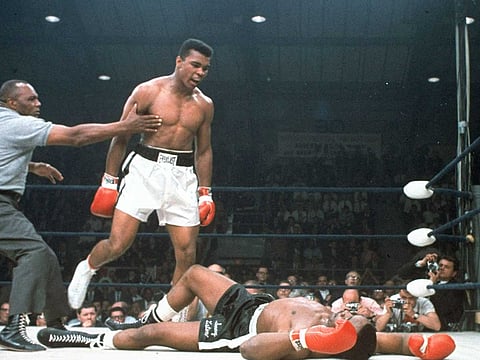Historic Liston fight gave birth to Ali legend
It displayed his strength of character to the world: doctor

Los Angeles: Cassius Clay had just beaten world champion Sonny Liston when he turned his wrath on the ringside reporters who had written him off as an underdog, shouting: “Eat your words!”
Liston, nagged by a shoulder injury, threw in the towel before the seventh round at Miami’s Convention Hall, surrendering his heavyweight championship belt to the loose-lipped 22-year-old on February 25, 1964.
Clay embraced Islam soon, thereafter, and changed his name to Muhammad Ali. Decades later, the legend of Ali still commanded the sports world.
But the moment that gave birth to that legend came in Miami, where Clay said all along he would defeat the “fat bear” Liston.
“Incredibly, the loud-mouthed bragging, insulting youngster had been telling the truth all along,” a New York Times reporter wrote in reference to Clay’s bold prediction of victory.
At the time of his name change, Ali had won his first 19 professional fights and was best known for his 1960 gold medal triumph at the Rome Olympics.
Born in Louisville, Kentucky, Ali became famous for being a verbal boxer who slugged his opponents with words — often in rhyme — before facing them in the ring.
Liston was 31 and had 36 fights under his belt, including a victory against Floyd Patterson, who like Sugar Ray Robinson and Joe Louis was highly regarded by the sport’s fans.
Fans disliked both Clay and Liston.
Clay was looked down upon for his big mouth and for cozying up to Malcolm X.
Unlike Clay, who was born in a middle-class family, Liston had 25 siblings and was born into impoverished surroundings in 1932 in the southern state of Arkansas.
Liston was a convicted criminal, who had learned boxing while serving a five-year prison term for robbery. He was known for rubbing elbows with the gangster Frankie Carbo, the son of a Catalan immigrant who had moved to the Bronx.
Liston had been overwhelmingly favoured to pummel Clay in the fateful bout.
Rain on the night of the fight, 7-to-1 odds and the widely held belief that Liston would knock out Clay in five minutes contributed to a low turnout at the Convention Hall. Only 8,297 of the arena’s 15,000 seats were filled.
When the bell rang, Clay used his famously fancy footwork to dance around Liston, who was anxious to hurt his young opponent.
But Clay, who sidestepped Liston’s first punches, surprised everyone by splitting one of Liston’s eyebrows in the second round.
Despite a successful early performance, Clay retreated to his corner in the third round blinded by a burning sensation in his eyes. It caused him such pain that he pleaded with his trainer, Angelo Dundee, to throw in the towel.
It is unknown why Clay’s eyes were burning. Whatever the cause, Dundee changed sports history by forcing Clay to box through his pain, telling him to keep his distance from Liston.
“All I did was give him the perfect instruction — run — and that is what he did,” Dundee told one of the ringside doctors, Ferdie Pacheco, according to the book, The 12 Greatest Rounds of Boxing.
“He ran and, thankfully, the dear Lord came into play; tear ducts cleaned (Clay’s) eyes and he proceeded to kick the heck out of the other guy,” Dundee said.
Liston was unable to take the ring for the seventh round. “This fight not only made the future Muhammad Ali a champion, it displayed his moral fibre and strength of character to the world. In fighting a killer like Liston while blind, Clay had vividly demonstrated his courage,” Pacheco said.
In an interview marking the 40th anniversary of the fight, Ali called it the most important of his career. “It was the most important because I proved I was qualified to be a champion,” he recalled.
“At first I was scared ... People thought he would kill me, but I proved them wrong.”
Sign up for the Daily Briefing
Get the latest news and updates straight to your inbox



